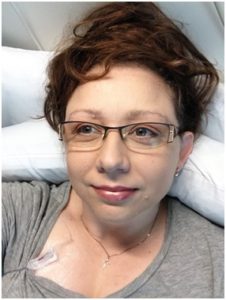Jodie’s intimate explanation of clinical depression
Married mother-of-two daughters with special needs, Jodie, 45, Brisbane was diagnosed with stage-four profuse  follicular non-Hodgkin’s lymphoma in 2006. Tragically, but understandably, the following year, Jodie was diagnosed with clinical depression and anxiety. She then embarked upon a nine year battle with depression.
follicular non-Hodgkin’s lymphoma in 2006. Tragically, but understandably, the following year, Jodie was diagnosed with clinical depression and anxiety. She then embarked upon a nine year battle with depression.
Jodie provides an intimate and authentic explanation of clinical depression.
“Clinical depression is like a darkness; a black cloud that comes over your mind and your spirit. It has a soul sort of impact. It takes away from your happiness and the feelings of completeness, and it removes everything that makes you happy. It feels like a fog in front of your life.
“Clinical depression takes away your ability to function normally in your everyday life. So I was unable to cook, clean or look after my children when I had depression that was undiagnosed. I was not able to make sense of what was going on in my mind,” said Jodie.
Following her first set of treatments for Lymphoma in mid 2007, Jodie sank into depression.
Despite being on anti-depressants post- diagnosis, Jodie continued to struggle with her mental health and wellbeing.
“Every time I had a medical incident or some kind of medical setback, my depression tended to get worse, and I felt more anxious about my life, and more anxious about what was happening with me. I really felt like I needed to re-visit my medication, and to look at what was happening to me, and determine whether to update my medication, or increase my dosage. This is what I did to manage my depression every time I experienced a relapse,” Jodie said.
Jodie is participating in the Australian Genetics of Depression Study to help researchers identify the genes that cause depression, and ultimately help find a cure for the debilitating mental illness.
“I think everyone who has depression can play a key role in helping others to be diagnosed quicker and sooner, and rather than experiencing a breakdown, should be able to access the medication and help they need.
“The Australian Genetics of Depression Study is very simple to participate in. All you need to do is go online, fill out a very simple survey, and if you qualify by having been treated for depression, you’ll receive a saliva kit in the mail. Then all you need to do is just spit into a little container, and this container is then sent off, and your DNA is analysed for clinical depression,” said Jodie.
Watch Jodie’s story here:
To join Jodie and other Australian volunteers participating in the Australian Genetics of Depression Study today, head here: http://www.geneticsofdepression.org.au/
